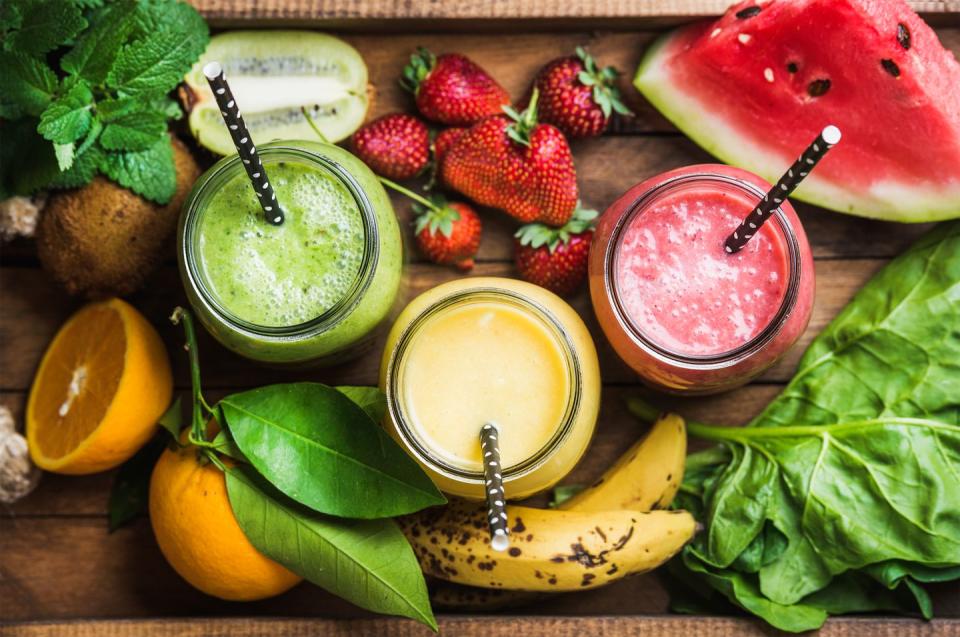Is the juice diet really the secret to rapid weight loss?

If you're hoping to lose a few pounds in a hurry, a diet based on fruit and vegetables might sound like the perfect solution. But before you dust off that juicer, following such a restrictive and low-calorie diet comes with a few long-term health implications that are also worth taking into consideration.
David Wiener, training and nutrition specialist at Freeletics, highlights what’s involved in the juice diet – and how it can affect your overall health.
What does a juice diet involve?
Juice diets are a popular quick-fix diet, promising dramatic weight loss, with some even claiming to detox the liver and transform your intestinal health. But can a juice diet really help you lose weight (sustainably) and boost your health in the process?
"Following a juice diet means consuming liquid mixes of fruits and vegetables, to help with weight loss," says Wiener.
"There are many versions of a juicing diet, with some plans replacing all meals and snacks with juices, and others replacing one or two meals a day with juices.
"These versions all last for varying periods of time. Some of the longer versions of the juice diet last for two to three weeks, but there are also plans which last for three, five, seven or 10 days."

The benefits
Most juice diets are based around consuming a variety of juiced fruits and vegetables, but the calorie intake is usually highly restricted.
"The juice diet works by heavily restricting the number of calories you consume and limiting the amount of “unhealthy” food you eat," explains Wiener.
"It’s a good way of increasing your fruit and vegetable intake. However, while the juicing process allows most of the vitamins, minerals and phytonutrients in the fruits and vegetables to remain, so the body can reap the benefits, it extracts the juices without the fibre, which is normally found in the pulp."
The drawbacks
As with most extreme diets, cutting out vital food groups does come with health concerns. "This diet certainly isn’t for everyone and it can have extreme side effects," warns Wiener.
"It’s a fairly controversial option, and while many will say it’s a great way to boost weight loss, it is only safe to do in the short term," he adds. "Juices will help your body get minerals and nutrients, but there are many vital components missing from juices, such as protein, which is needed by the body to build healthy immune cells, and fibre, which is essential for your body and waste removal."
Juices also contain a lot of sugar, which can present problems for the body. "Consuming nothing but juice can cause havoc in your blood stream, which could result in an energy dip and fatigue, as well as additional sugar cravings, which won’t help your weight-loss goals," says Wiener. "The juice diet can also make users feel incredibly hungry, moody, and result in headaches, as well as changes in bowel functioning."
The long-term side effects
While a restrictive low calorie diet might help you drop a few pounds on the scales in the short term, the long-term health implications are worth considering.
"There are suggestions that this increased consumption of sugar could lead to tooth decay," says Wiener. "In addition, drinking solely fruit juice may increase blood sugar and triglycerides in the long term, which could potentially damage your health."
The juice diet verdict
Before embarking on any new diet programme, it’s important to seek medical advice if you have concerns about your suitability for it. "The high consumption of natural sugars means this diet is not suitable for those with diabetes or blood sugar management issues, and it is also not advisable for anyone who has kidney or liver conditions, epilepsy, low blood pressure or a history of eating disorders," states Wiener.
With this in mind, it seems that, while there may well be some weight-loss benefits from partaking in a juice diet, these are unlikely to be sustained. If you're really serious about losing weight in a healthy and sustainable way, incorporate juices and smoothies into a well-balanced diet including plenty of fruit and veg, to give your body the full range of fats, carbs, protein, vitamins and minerals that you need.
Like this article? Sign up to our new newsletter to get more articles like this delivered straight to your inbox.
You Might Also Like


